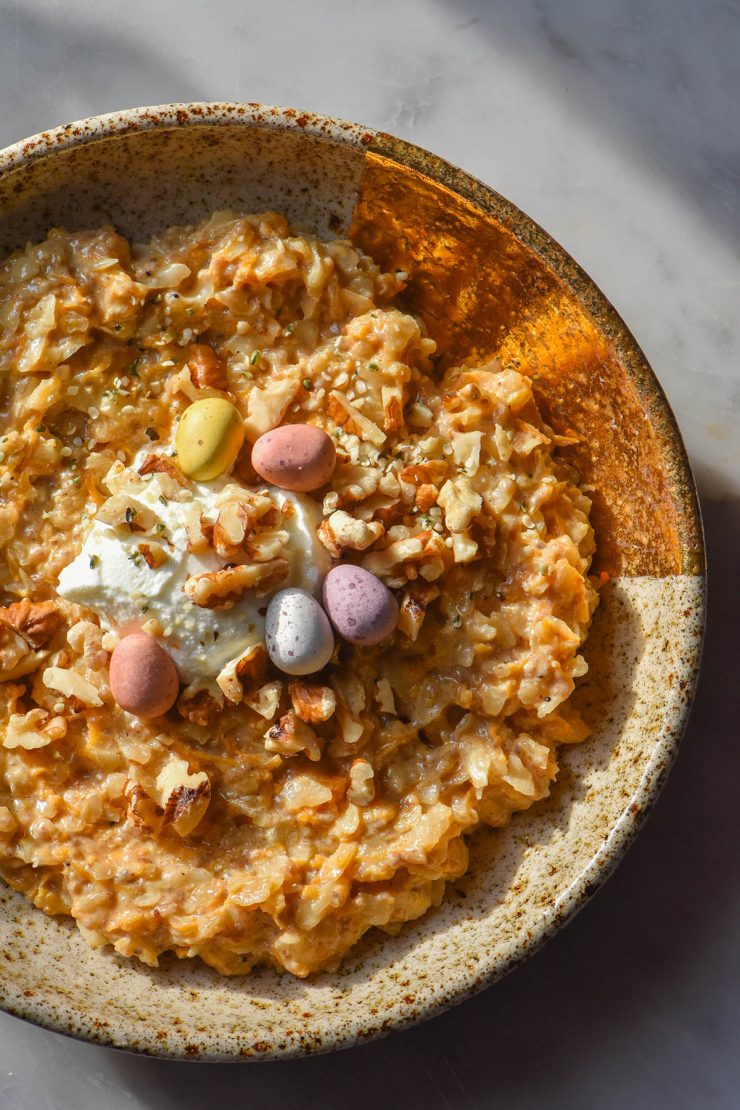
Easter is fast approaching and the weather is starting to cool down here in Australia. Although carrot cake is a year round treat, I decided that a festive porridge should be on the agenda. This gluten free carrot cake porridge is the perfect Easter season breakfast and it is made entirely without oats.
Gluten free carrot cake porridge (no oats)
This gluten free porridge, like my original gluten free porridge recipe, uses rice flakes. Oats are not considered gluten free in Australia, as the protein they contain (avenin) is similar to gluten. Coeliac Australia suggests that more testing needs to be done to determine how this protein affects coeliacs. As such, oats are off the menu for those on a strict gluten free diet.
The porridge itself is a simple mix of butter, rice flakes, milk, maple syrup and chia seeds. Rice flakes don’t really thicken in the same way a traditional porridge does, so the chia seeds work to bring the porridge together at the end.
To make this porridge carrot cake flavoured, we need a few extra ingredients. Firstly, freshly (and finely) grated carrot. I use the finest side of my grater so that the carrot will ‘melt’ into the porridge. Chopping the grated carrot can also help texturally.
Secondly, spices! I use equal amounts of cinnamon and nutmeg. A strong nutmeg presence is what makes carrot cake carrot cake, to me.
All in all, this recipe is a quick and delicious breakfast with some added vegetable as a bonus.
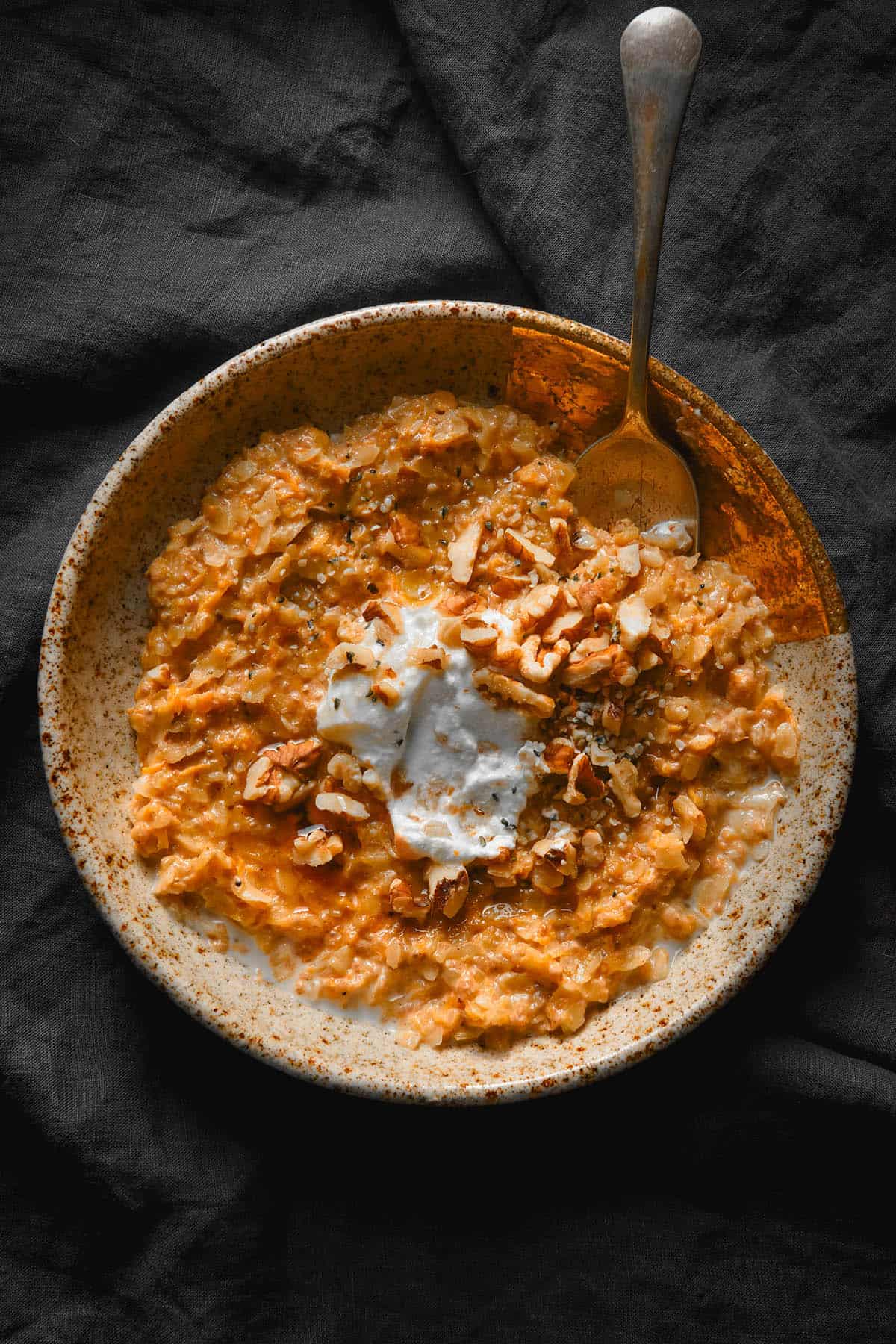
Tips for your gluten free carrot cake porridge
Anecdotally, I found that white rice flakes (sometimes called poha) tend to absorb a lot less liquid than brown rice flakes. If you can only find white rice flakes, I recommend using less milk. You can also course correct if your porridge is too wet by adding extra chia seeds, some hemp seeds and/or an egg white.
Cinnamon is important in this recipe, but nutmeg is critical. In my biased opinion, nutmeg is what makes carrot cake taste like carrot cake. If you omit the nutmeg, you probably won’t get the carrot cake vibes.
I have found that this porridge tends to absorb liquid more slowly when compared to the original recipe. The simple solution to a porridge that is too wet and not cohesive is to continue to cook it after adding the chia seeds. My suspicion is that the carrots interfere with the absorption process when compared to a version without them.
Personally, I like to grate my carrot on the finest side of the grater. If I’m feeling particularly motivated, I will also cut the grated carrot a little finer. This all helps in ensuring the carrot isn’t thick, stringy and uncooked.
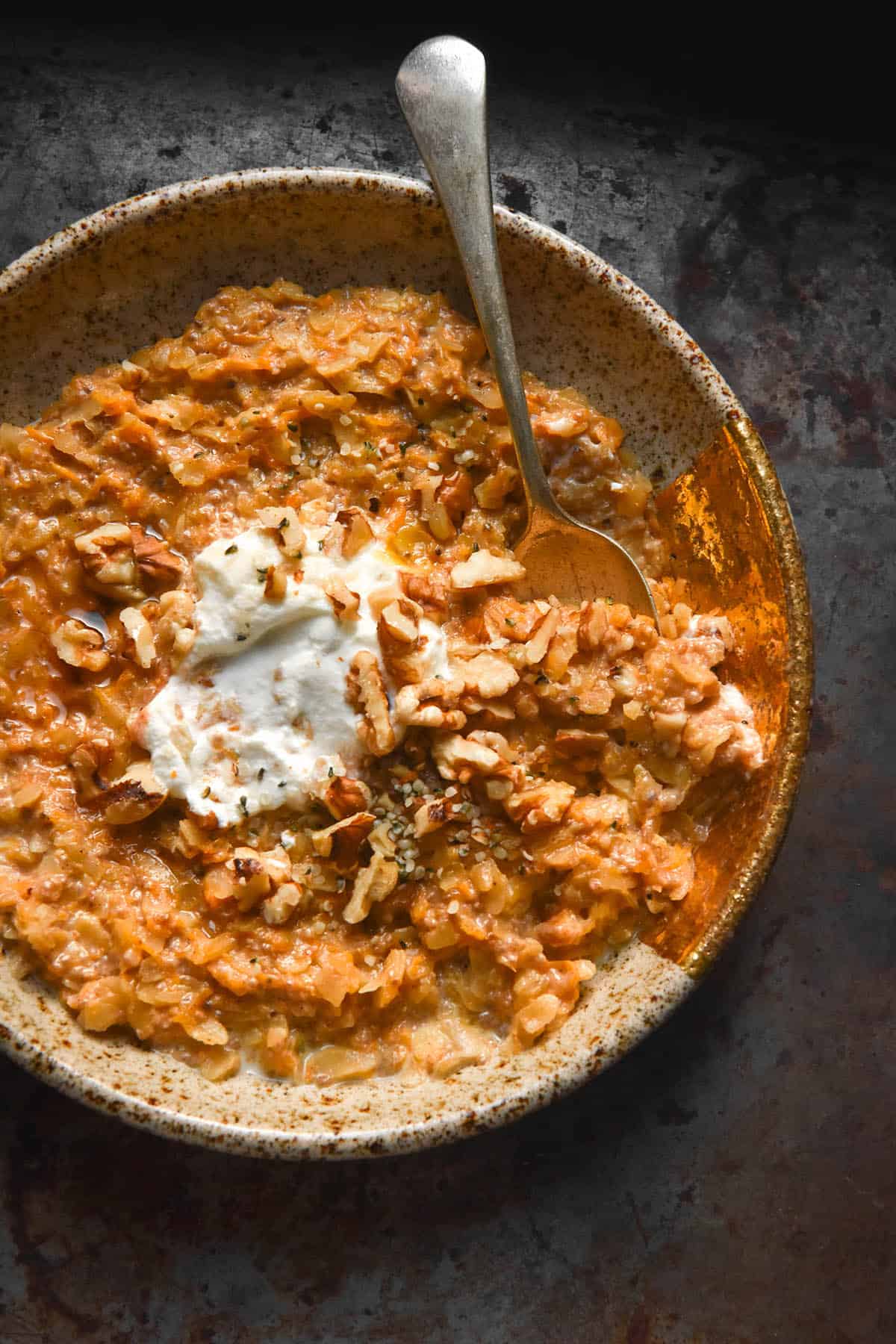
Adding protein to your porridge
There are a few easy ways to add extra protein to this porridge. If you use regular milk, 250ml (1 cup) equates to around 8-9g protein. If you end up using an extra 60ml (1/4 cup) milk, that is 10g of protein right off the bat.
Keep in mind this protein content differs a little from brand to brand. Using light or lactose free might change the protein content, so be sure to read the label of the milk you’re buying.
Next, you can add 1-2 tablespoons hemp seeds. 1 tablespoon of hemp seeds is 12.5g according to my scales, and a 25g/2 tablespoon serving of the brand I used (Australian hemp seeds) contains 8g protein.
After some more? Add an egg white or whole egg to your porridge right after cooking and stir well. In the time it takes for the chia seeds to set up, the egg will gently cook through. You can also continue to cook your porridge on a low heat if uncooked egg concerns you.
The protein content of an egg is split roughly between the yolk and the white. An extra large egg contains around 6g protein per serve.
1 tablespoon of chia seeds has around 3.5g protein (according to Coles brand) and 50g of rice flakes contains approximately 3.7g protein.
Finally, to serve! You can top your gluten free carrot cake porridge with some nut butter and/or high protein yoghurt. Almond butter has around 3-4g protein per tablespoon and would best complement the flavour profile of the porridge. High protein yoghurt can have up to 9-10g protein per 100g.
If you were to implement all of these options, this porridge would contain over 40g protein.
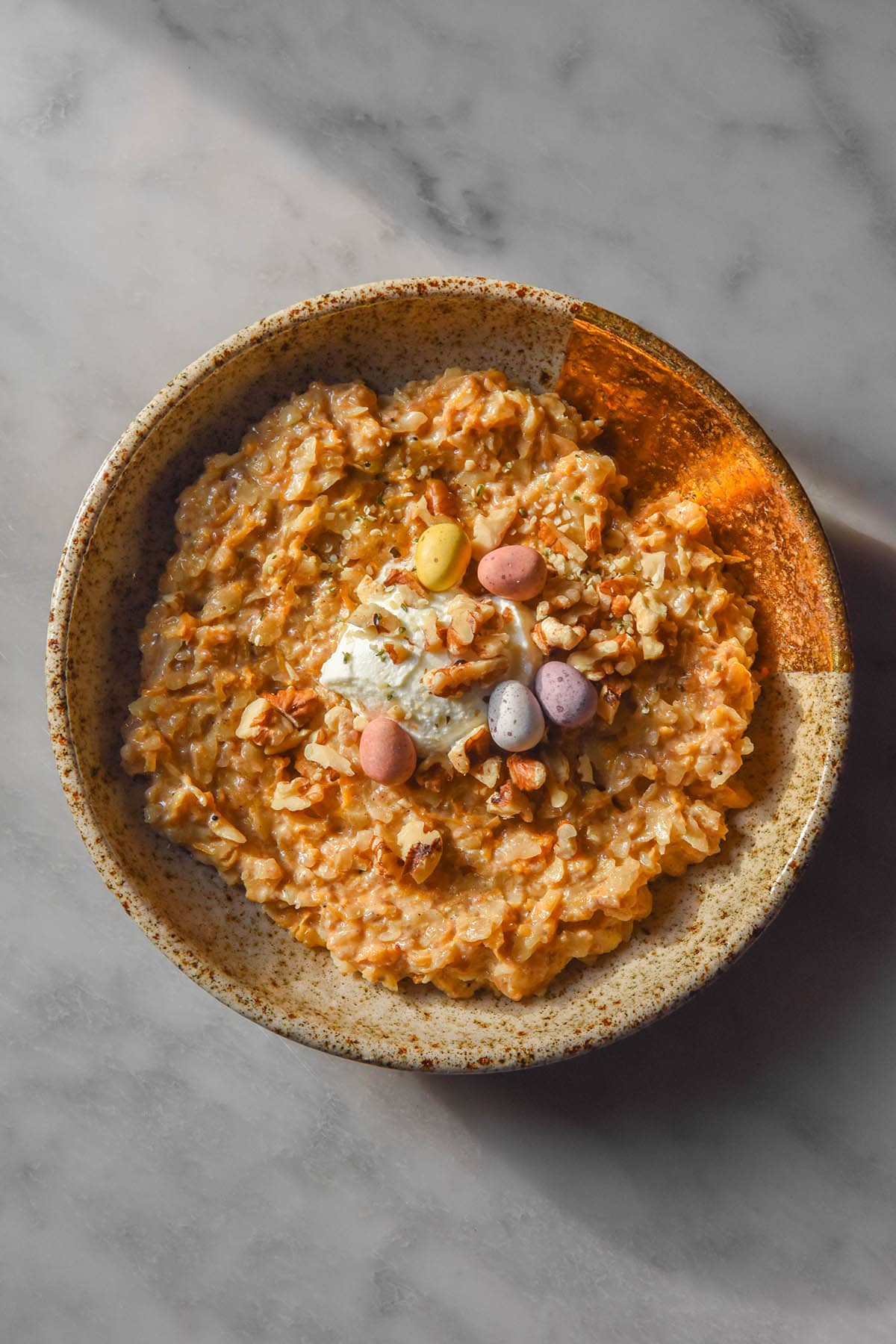
FODMAP notes for your gluten free carrot cake porridge
If you have issues with lactose, be sure to choose a lactose free milk. This can be lactose free dairy free milk or a low FODMAP plant based alternative. Low FODMAP milk options include soy milk made with soy protein, macadamia milk and rice milk.
Monash lists rice flakes as low FODMAP in 30g, but doesn’t provide an upper limit.
FODMAP Everyday give a very small rice flake threshold (7g) so I will keep an eye out for any updates from Monash. For now, you can see what works for your own system and requirements.
None of the other ingredients for the porridge are high FODMAP ingredients. Choose low FODMAP toppings to ensure your porridge remains low FODMAP.
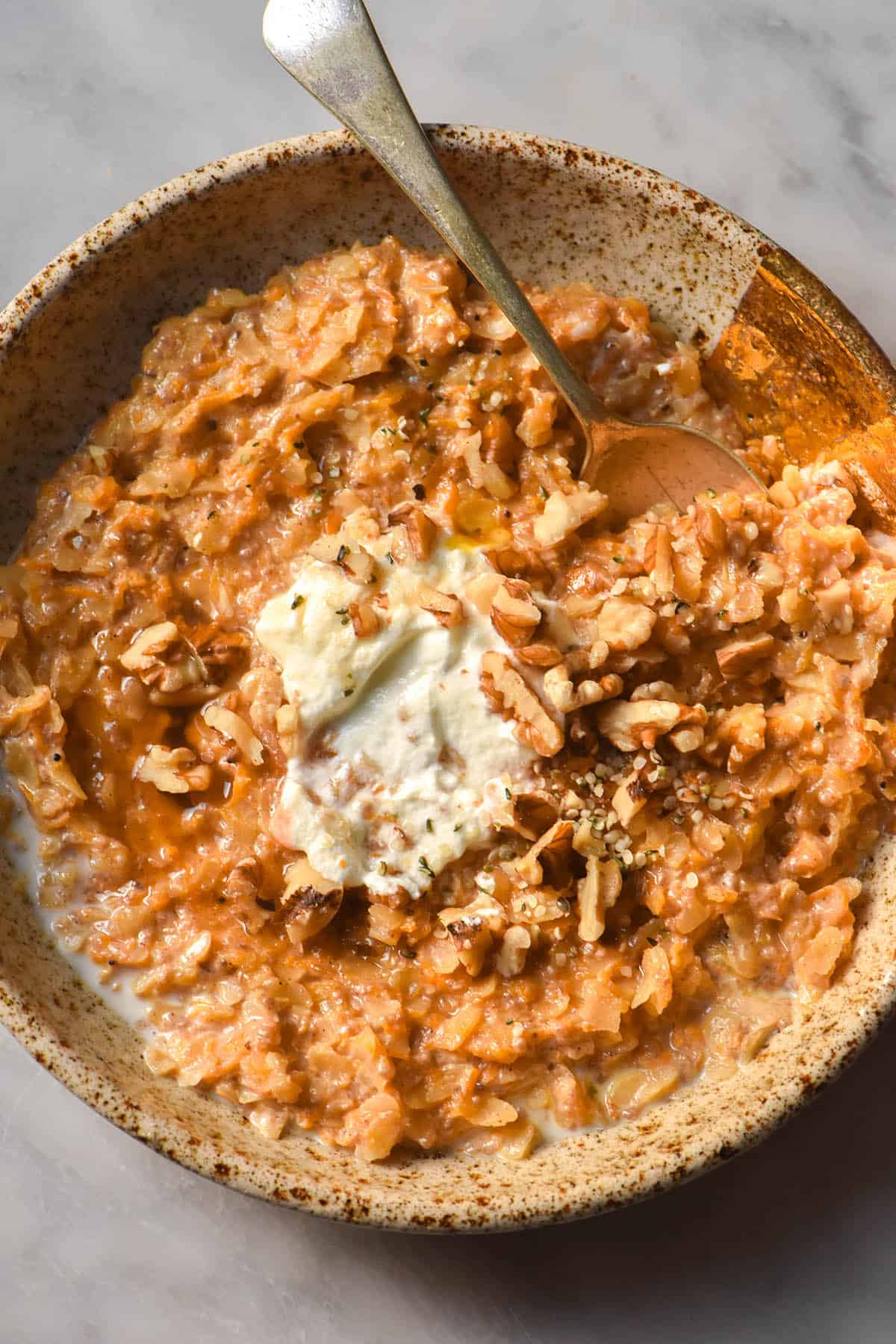
More gluten free breakfast recipes
- Gluten free bagels without xanthan gum
- Gluten free buckwheat bread
- 100% buckwheat cinnamon raisin loaf from my second buckwheat flour e-book
- Vegan no bake breakfast bars from my cookbook, Intolerance Friendly Kitchen
- Gluten free vegan cinnamon rolls without yeast
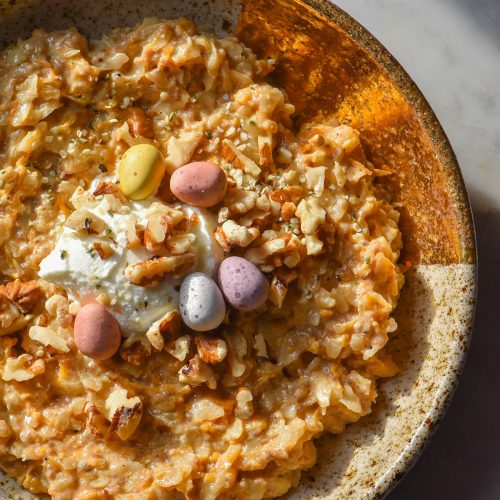
Gluten free carrot cake porridge
Ingredients
- 25 g butter regular or vegan
- 60 g (1/2 cup) brown rice flakes
- 180-310 ml (¾ – 1 ¼ cups)* milk of choice
- 40 ml (2 tablespoons)* maple syrup
- 50 g carrot finely grated
- ¼ – ½ teaspoon cinnamon powder
- ¼ teaspoon nutmeg powder add to taste if using fresh
- 15g (1 tablespoon)* white chia seeds Use 4 NZ, US, British, Canadian and European tablespoons
- Toppings of choice
Instructions
- Place the butter in a medium saucepan over a medium heat. Once melting, add the rice flakes, milk, maple syrup, grated carrot, cinnamon and nutmeg and whisk to combine. Add a pinch of salt if you like.
- Cook for 5 minutes, whisking intermittently until the porridge is thicker (not necessarily thickened) and the rice flakes are cooked.
- Whisk in the chia seeds and continue to cook it until it reaches your desired consistency. How long this takes will depend on how much milk you added in the initial stages. You can add more milk here if your porridge is thicker than you intended.
- Taste and adjust for seasoning and serve with your desired toppings. I used Greek yoghurt, chopped walnuts, hemp seeds and some speckled eggs.

No Comments